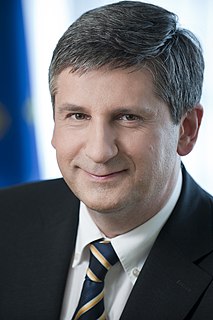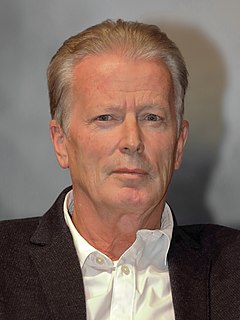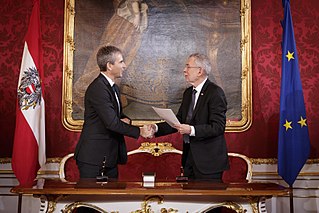President is a common title for the head of state in most republics.

The Federal Chancellor of Austria is the head of government of the Republic of Austria. The position corresponds to that of Prime Minister in several other parliamentary democracies.

A rector is a senior official in an educational institution, and can refer to an official in either a university or a secondary school. Outside the English-speaking world the rector is often the most senior official in a university, whilst in the United States the most senior official is often referred to as president and in the United Kingdom and Commonwealth of Nations the most senior official is the chancellor, whose office is primarily ceremonial and titular. The term and office of a rector can be referred to as a rectorate. The title is used widely in universities in Europe and is very common in Latin American countries. It is also used in Brunei, Macau, Turkey, Russia, Pakistan, the Philippines, Indonesia, Israel and the Middle East. In the ancient universities of Scotland the office is sometimes referred to as Lord Rector, is the third most senior official, and is usually responsible for chairing the University Court.

The vice-chancellor of Germany, unofficially the vice-chancellor of the Federal Republic of Germany, officially the deputy to the federal chancellor, is the second highest ranking German cabinet member. The chancellor is the head of government and, according to the constitution, gives this title of deputy to one of the federal ministers. It is common that the title is given to the major minister provided by the (smaller) coalition partner.
A presidency is an administration or the executive, the collective administrative and governmental entity that exists around an office of president of a state or nation. Although often the executive branch of government, and often personified by a single elected person who holds the office of "president", in practice, the presidency includes a much larger collective of people, such as chiefs of staff, advisers and other bureaucrats. Although often led by a single person, presidencies can also be of a collective nature, such as the presidency of the European Union is held on a rotating basis by the various national governments of the member states. Alternatively, the term presidency can also be applied to the governing authority of some churches, and may even refer to the holder of a non-governmental office of president in a corporation, business, charity, university, etc. or the institutional arrangement around them. For example, "the presidency of the Red Cross refused to support his idea." Rules and support to discourage vicarious liability leading to unnecessary pressure and the early termination of term have not been clarified. These may not be as yet supported by state let initiatives. Contributory liability and fraud may be the two most common ways to become removed from term of office and/or to prevent re-election.
Bundeskanzler or Bundeskanzlerin, and the shortened form Kanzler or Kanzlerin may refer to:
Chancellor is a title of various official positions in the governments of many nations. The original chancellors were the cancellarii of Roman courts of justice—ushers, who sat at the cancelli or lattice work screens of a basilica or law court, which separated the judge and counsel from the audience. A chancellor's office is called a chancellery or chancery. The word is now used in the titles of many various officers in various settings. Nowadays the term is most often used to describe:

The president of Austria is the head of state of the Austrian Republic. Though theoretically entrusted with great power by the Constitution, in practice the president is largely a ceremonial and symbolic figurehead.

The University of Fribourg is a public university located in Fribourg, Switzerland.

The vice-chancellor of Austria is a member of the Government of Austria and is the deputy to the Chancellor. It is functionally equivalent to a deputy prime minister in other countries with parliamentary systems.
Bernhard is both a given name and a surname. Notable people with the name include:
A chancellor is a leader of a college or university, usually either the executive or ceremonial head of the university or of a university campus within a university system.

The Government of Austria is the executive cabinet of the Republic of Austria. It is composed of the Chancellor, who is head of government, the Vice-Chancellor, and the ministers.

The Federal Chancellery of Switzerland is a department-level agency of the federal administration of Switzerland. It is the staff organisation of the federal government, the Federal Council. As of 2016, it is headed by Federal Chancellor Walter Thurnherr of the Christian Democratic People's Party of Switzerland.

Michael Spindelegger is an Austrian politician. He served in the cabinet of Chancellor Werner Faymann as foreign minister of Austria from 2008 to 2013 and as finance minister from 2013 to 2014; additionally, he held the office of vice-chancellor from 2011 to 2014. Spindelegger was also the leader of the Austrian People's Party (ÖVP) from 2011 to 2014. In August 2014 he unexpectedly resigned from all political positions. Since 2016, he has been serving as Director General of the Vienna-based International Centre for Migration Policy Development (ICMPD).

The chancellor of Germany, officially the Federal Chancellor of the Federal Republic of Germany, is the head of the federal government of Germany and the commander in chief of the German Armed Forces during wartime. The chancellor is the chief executive of the Federal Cabinet and heads the executive branch. The chancellor is elected by the Bundestag on the proposal of the federal president and without debate.

Prince Ernst Rüdiger Camillo von Starhemberg, often known simply as Prince Starhemberg, was an Austrian nationalist and politician who helped introduce austrofascism and install a clerical fascist dictatorship in Austria in the interwar period. A fierce opponent of Anschluss, he fled Austria when the Nazis invaded the country and briefly served with the Free French and British forces in World War II.

Reinhold Mitterlehner is an Austrian politician of the Austrian People's Party (ÖVP) who served as minister of economy in Austria's government from 2008 until 2017. In September 2014 he also became vice chancellor of Austria and chairman of the ÖVP. On 9 May 2016 he briefly assumed powers and duties as Acting Chancellor of Austria while his coalition partner, the Social Democratic Party, underwent a change in leadership. After a series of quarrels within the grand coalition as well as his own party, Mitterlehner announced his resignation on 10 May 2017, which became effective on 17 May 2017.

In Austrian constitutional law, a minister is a member of the national cabinet. Most ministers are responsible for a specific area of Austrian public administration and stand at the head of a specific department of the Austrian bureaucracy; ministers without portfolio exist and used to be common in the First Austrian Republic but are rare today. Most ministers control a ministry; some ministers control a section of the Chancellery, the ministry headed by the chancellor. A minister is the supreme executive organ within his or her area of responsibility: ministers do not take orders from either the president or the chancellor; their decisions are subject to judicial review but cannot be overruled by any other part of the executive branch.

The Bierlein government was the 32nd Government of Austria following the collapse of the First Kurz government headed by Chancellor Sebastian Kurz in the aftermath of the Ibiza affair. Sworn in on 3 June 2019, the Bierlein government was the first purely technocratic government in Austrian history, first interim government after a successful motion of no confidence in Parliament and first government headed by a female chancellor. As head of government, Brigitte Bierlein was assisted by Clemens Jabloner as vice-chancellor.











